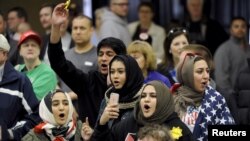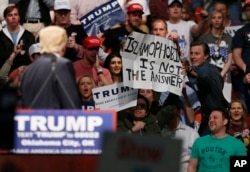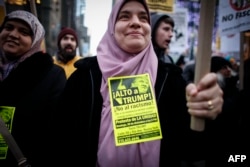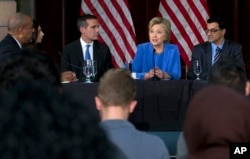Muslim voters in the United States are increasingly moving toward the Democratic Party. They are expected to vote in record numbers for Democrat Hillary Clinton in the U.S. presidential election in November.
Muslim-Americans were once seen as supporters of the Republican Party. In fact, a large majority of them voted for Republican George W. Bush in the 2000 presidential election.
But opinion surveys show they are more likely to support Clinton than Donald Trump, the Republican candidate, in the November vote. And some critics say the Republican Party has lost a chance to keep an increasingly influential group of voters.
Public opinion surveys completed after the 2000 election found that more than 70 percent of Muslim-American voters supported George W. Bush. Most of the 50,000 Muslim voters in the state of Florida marked their ballots for the then Texas governor. Experts note that Bush won the presidency only because he won in Florida. He captured the state after receiving 537 more votes than his leading opponent, Al Gore.
Muslim-Americans and many conservatives believed that Bush’s victory in Florida showed the growing influence of Muslim voters. And they said it showed that Republicans and Muslims shared many of the same values and beliefs.
'Social and economic conservatives'
Suhail Khan is a well-known Muslim-American and a Republican. He once served as a board member of the American Conservative Union. In the magazine Foreign Policy, he noted that most Muslim-Americans are “both socially- and economically-conservative” like many Republicans.
Many Muslim-Americans and Republicans do share conservative values like supporting strong families and traditional marriage. They also oppose legalization of operations for ending pregnancies. Khan noted that about one-fourth of Muslim-Americans own small businesses. He said they support Republican efforts to lower taxes.
But some observers believe there is another reason so many Muslim-Americans voted for George W. Bush in 2000.
John Esposito is a professor at Georgetown University and wrote a book called The Future of Islam.
He says Muslim-Americans may have thought that Bush would have ideas similar to those of his father, former President George H.W. Bush. They liked the former president’s way of dealing with the conflict between Israelis and Palestinians.
But Muslim-Americans soon had different ideas about George W. Bush. In the 2004 election, more than 90 percent of them supported his opponent, Senator John Kerry. Four years later, 89 percent of Muslim-Americans voted for Democrat Barack Obama. In 2012, he won 85 percent of the Muslim-American vote, according to several estimates.
Islamophobia prompted a switch
So why did so many Muslims stop voting for Republican candidates after the 2000 election? The most common answer given by Muslim activists is that there was a rise in Islamophobia -- a fear or distrust of Muslims. Many Muslim-Americans also came to believe that U.S. foreign policy harmed Muslims around the world.
After the attacks of September 11, 2001, President Bush stated that the United States was not at war with Islam. But since then, Republican policies and comments have persuaded many Muslims that the party is home to many Americans who do not like them.
Robert McCaw is with the Council on American-Islamic Relations. He says “sadly, the Republican Party over the past 15 years has become the political epicenter of Islamophobia, introducing anti-Muslim policy proposals or anti-foreigner laws in at least 10 state legislatures. This has really driven the Muslim vote out of the Republican Party.”
But Islamophobia and foreign policy alone do not explain why Muslim-Americans have turned toward the Democratic Party. Georgetown’s John Esposito says another reason might be the Republican position on immigration. He notes that most Muslim-Americans are immigrants.
The Democratic Party has been largely pro-immigration and supports social welfare policies designed to help immigrants. Esposito says the Republican Party is seen as supporting anti-immigrant policies.
The United States is home to about 3.5 million Muslims. About one-third of them are African-Americans, who have long supported Democrats. But most Muslims in the U.S. are immigrants. They have come from many countries, and most of them are conservative.
But surveys show that the children and grandchildren of Muslim immigrants are less conservative than their parents. Many second- and third-generation Muslims support Democrats and hold beliefs that are different from those of the Republican leadership.
Switching policies as well as parties
In 2011, the Pew Research Center reported that 70 percent of Muslims in the U.S. described themselves as Democrats or agreeing with Democratic policies. Only 11 percent said they were Republicans or supported Republican policies. Experts believe the numbers have not changed since the study was completed.
Robert McCaw says another survey found 55 percent of Muslim-Americans called themselves moderate and 26 percent claimed to be liberals.
Some experts thought conservative Muslims and Republicans shared common positions on such issues as homosexuality and the duties of government.
But the 2011 Pew survey found that Muslim-Americans have grown “considerably more accepting of homosexuality” since 2007. It found that 68 percent of Muslim-Americans wanted a larger government providing more services than a smaller government providing fewer services.
McCaw says, “not only do they switch parties and now are voting Democratic, but they’re also adopting some of the policies and positions and ethics” of the Democratic Party.
"Traditionally, a number of immigrants from the Middle East or South Asia are more socially conservative, and there was a place for them in the Republican Party. But I think as people grow and develop in America, [they] definitely change their views and preferences over time; and more importantly, their children grow up here and they might be voting different than their parents previously had.”
Esposito says that Republicans and Muslims were never really natural allies. He says culturally and politically most Muslims are more like Democrats. He notes that surveys show many more Republicans than Democrats have negative beliefs about Islam and Muslims.
At home among Democrats
The 2011 Pew Research Center survey also found that only 15 percent of Muslims believe the Republican Party is friendly toward their community. That is compared to 48 percent of those asked, who see it as unfriendly. The center said that 46 percent of Muslims found the Democratic Party friendly toward them, and only 7 percent said it was unfriendly.
Sajid Tarar is a Muslim-American activist. He now campaigns for Republican candidate Donald Trump. He does not agree that most Muslims feel at home in the Democratic Party.
But studies show that the Muslim-American move away from the Republican Party has sped up following comments from Republican candidates, including Trump.
The businessman angered many Muslims when he said “Islam hates us.” He also suggested that all Muslims should be banned from entering the country.
Historically, few Muslim-Americans vote. But the U.S. Council of Muslim Organizations has launched a campaign to register one million new voters. That would represent an increase of nearly 300,000 since the 2012 presidential election.
Muslim vote could affect tight races
Some political observers believe many Muslim-Americans will vote this year. Esposito predicts that as many as 80 percent of them will vote for Clinton.
While there are relatively few Muslim-American voters, there are large Muslim communities in Florida, Ohio, Virginia, Michigan and Pennsylvania. These are also important states in the presidential election.
Muslim activists say the Muslim-American vote could decide who will win in these so-called “swing states.”
I’m Pete Musto.
And I’m Anne Ball.
Masood Farivar reported this story for VOANews.com. Christopher Jones-Cruise adapted his report for Learning English. George Grow was the editor.
We want to hear from you. Write to us in the Comments Section, or visit our Facebook page.
_______________________________________________________________
Words in This Story
epicenter – n. the part of the earth’s surface that is directly above the place where an earthquake starts (sometimes used figuratively, as in this article)
natural – adj. usual or expected








